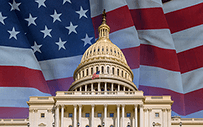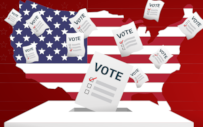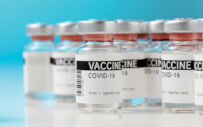
Since taking office, the Trump administration has issued dozens of executive orders, many of which affect institutions of higher education and employers. The executive orders related to diversity, equity, and inclusion (DEI); immigration; and related policy changes are the most consequential in this regard.

More than 200 senior career services leaders took part in a March 5 virtual meet up hosted by NACE to discuss effects of the Trump administration’s recent executive orders and “Dear Colleague” letter on the profession.

The Trump administration has issued several executive orders and taken other actions that impact the work of career services and early talent recruiting professionals.

Employers may use multiple avenues to screen potential candidates. These include 1) creating the job description, 2) creating the written application, 3) conducting the interview, 4) determining which background screening methods to use, and most recently, 5) navigating the use of artificial intelligence (AI). Each contains potential legal liability for the employer if not conducted correctly.

Using AI in the preemployment process can increase objectivity but can also increase the risk of discriminating against candidates.

The latest federal updates will keep NACE members informed on how career services and recruiting are impacted by federal action, what developments can be expected, and opportunities available for them to weigh in.

On June 29, 2023, in Students for Fair Admissions, Inc. v. President and Fellows of Harvard College and Students for Fair Admissions, Inc. v. University of North Carolina, the U.S. Supreme Court struck down the affirmative action policies at Harvard College and the University of North Carolina. The court’s decision striking down race-based college and university admissions policies and programs will have sweeping and immediate consequences for higher education throughout the country.

Signed into law in 1963, the Equal Pay Act prohibits pay discrimination based on sex. However, 60 years since the passage of the law, women continue to experience a pay gap, relative to men.

The 2022 midterm elections brought many surprises. While we still don’t know all the winners and losers, we do know who the key decision-makers will be and what we expect their priorities to be related to higher education and the workforce.

The H-1B is the most common work visa in the United States. Using the H-1B category, U.S. employers are permitted to hire international workers who have at least a four-year U.S. bachelor’s degree or the foreign equivalent, if the individual will work in a position requiring the type of degree that the graduate has.

Historically, employers conducted preemployment drug testing to promote a drug-free work environment and safe working conditions for all employees. Applicants who tested positive for prohibited substances, including marijuana, were generally excluded from further consideration for employment. However, as more states legalize the use of medicinal or recreational marijuana, employers are facing difficult decisions regarding their preemployment drug testing policies.

This article discusses maintaining and handling protected data, including how to an internal or third-party breach.

Sample Hold Harmless Agreement, courtesy of Florida State University.

This Employer Nondiscrimination Policy Statement can be used by NACE members to indicate that they are committed to providing equal employment opportunity for all persons regardless of race, color, religion, sex, age, national origin, citizenship status (as defined under the Immigration Reform and Control Act), disability, or veterans status.

Given the complexity and variety of laws, it is not surprising that employers, applicants, and career services professionals alike are confused about what is and isn’t legal in the case of marijuana—medical and recreational. This article addresses marijuana use as it pertains to some of the most pressing questions surrounding recruiting and hiring.

There are potential benefits to using artificial intelligence (AI) in the recruitment and screening of job applicants and in the hiring process, but there are also legal ramifications that must be understood prior to implementing any AI hiring system.

Attorneys George Hlavac and Edward Easterly discuss potential pitfalls in the application and interview for applicants and employers.

Interns should be are aware of the law and understand what remedies are available should they believe they are being subjected to harassment in the workplace during their internship.

What constitutes harassment? How are employers required to respond? What should employees do if they believe they are being harassed? Are unpaid interns protected?

Employers may require new hires and interns to sign restrictive covenants, such as noncompete, nonsolicitation, and/or nondisclosure agreements. Attorneys George Hlavac and Ed Easterly discuss the issues.

The Office of Federal Contract Compliance Programs has started scheduling Vietnam Era Veteran Readjustment Assistance Act-focused reviews.

Attorney Edward Easterly addresses some of the key legal questions that have arisen in regard to the coronavirus pandemic for career services, employers, and new college graduates and interns.

When a data breach comes from a third-party vendor, both the vendor and the party that provided the initial information may be subject to potential liability.

Career centers and students must be vigilant about fraudulent employers and should identify steps to take to verify the legitimacy of an employer.

The significantly increased use of social media has changed the way employers and courts have handled noncompete and nonsolicitation agreements.

Immigration attorney Mark B. Rhoads answers several critical questions about international students navigating the visa sponsorship process.

Can an employer mandate that its employees (or interns) obtain the vaccination? The answer, not surprisingly, is not a simple “yes” or “no.” The ADA as well as other laws and regulations play a role in determining what, legally, an employer can mandate.

Can employers mandate employees and interns to be vaccinated against COVID-19? Can job candidates be asked if they are vaccinated? This article address five common questions about the COVID-19 vaccine as it relates to hiring and employment.

The legalization of recreational and/or medical marijuana in many states raises a series of issues for employers and employees alike. How are drug testing policies affected? Must employers accommodate use of marijuana for medical purposes? What does legalization mean for federal contractors?

Career center staff should vet job postings as thoroughly as possible before posting them to avoid posts that are fraudulent or discriminatory.

The key for reference providers is to know what information should and can be disclosed, and what legal ramifications arise as a result of improper disclosures.

Career services professionals should know the key points of the Family Educational Rights and Privacy Act (FERPA) and how they can ensure their institutions are in compliance with FERPA’s requirements.

Although some recommend a student or new graduate volunteer to work unpaid to gain experience, it is illegal for-profit organizations to have “volunteers” perform work.

There are a number of laws and regulations governing internships, including whether an intern is classified as an employee. Others cover compensation-related issues—including whether an intern can be paid if they receive credit—workplace safety, employment agreements, and more.

Many career services professionals are asked to prescreen candidates for employers—to identify their “best” students. So, too, are faculty members. Beyond a host of ethical issues involved in such a request, there are legal implications.

Given the ever-changing nature of employment laws, it is important to understand what is permissible in diversity hiring and recruiting.

Employers are not required to interview an international student who has an F-1 or J-1 visa, even if the student is otherwise qualified for the job. Although employers can refuse to interview or hire international students who do not already have some form of permanent work authorization, most cannot stipulate that U.S. citizenship is a job requirement.

In today’s marketplace, college students may be offered a wide variety of employment opportunities. The following information should help career services professionals advise their students on the nature of these opportunities.

What materials on the Internet are copyrighted and can you repost them? This article discusses copyright online and issues surrounding it.